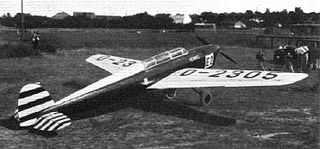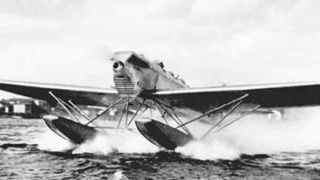Related Research Articles

The Heinkel He 116 was an extremely long-range mail plane designed to deliver airmail between Germany and Japan. Several examples were built for this role, as well as a small batch to be used in the long-range reconnaissance role.

The Heinkel He 118 was a prototype German monoplane dive bomber design that lost out to the Junkers Ju 87 Stuka in the 1930s, and was never ordered by the Luftwaffe.

The Yokosuka R2Y Keiun was a prototype reconnaissance aircraft built in Japan late in World War II.

The Heinkel Lerche was the name of a set of project studies made by German aircraft designer Heinkel in 1944 and 1945 for a revolutionary VTOL fighter and ground-attack aircraft.

The Heinkel He 72 Kadett ("Cadet") was a German single-engine biplane trainer of the 1930s.

The Darmstadt D-22 was a sports-plane of Germany, designed and built by Akaflieg of Technische Universität Darmstadt.

The Heinkel HD 42 50, later designated the Heinkel He 42 was a German two-seat biplane seaplane originally designed for the Deutsche Verkehrsfliegerschule, and later built for the German Luftwaffe. The aircraft was used until the end of World War II as a trainer for maritime pilots.

The Heinkel HE 12 was a pontoon-equipped mail plane built in Germany in 1929, designed to be launched by catapult from a liner at sea.

The Heinkel HD 39 was a special-purpose cargo aircraft developed in Germany in the 1920s to distribute the Berlin newspaper B.Z.. It was a conventional single-bay biplane with staggered wings of equal span, and a fuselage that nearly filled the interplane gap. The pilot sat in an open cockpit, and the undercarriage was of fixed, tailskid type with divided main units. The sole example of the type was built after Ernst Heinkel found out, by chance, that B.Z. required such an aircraft and had ordered two machines from Albatros. Heinkel convinced publisher Ullstein-Verlag to purchase a third aircraft from his firm.

The Heinkel He 64 was a sports plane built in Germany in 1933 to participate in the touring plane championships that year, designed by Siegfried and Walter Günter.

The Blohm & Voss Ha 140 was a German multi-purpose seaplane first flown in 1937. It was intended for use as a torpedo bomber or long-range reconnaissance aircraft, but did not enter production.

The Gotha Go 150 was a light aircraft designed at the German company Gothaer Waggonfabrik in the late 1930s. It was intended for civilian use, but ended up being used as a military trainer.

The Messerschmitt P.1111 was a jet fighter/interceptor project, designed by Messerschmitt for the Luftwaffe near the end of World War II.

The Focke-Wulf 1000x1000x1000, also known as Focke-Wulf Fw 239, was a twin-jet bomber project for the Luftwaffe, designed by the Focke-Wulf aircraft manufacturing company during the last years of the Third Reich.
The Heinkel HD 14 was a single-engine biplane torpedo aircraft developed by the German aviation company Ernst Heinkel Flugzeugwerke in the twenties and produced in a single prototype, under license, from Swedish by Svenska Aero in Stockholm.
The Heinkel HD 16 was a single-engine biplane torpedo aircraft developed by the German aviation company Ernst Heinkel Flugzeugwerke in the nineteen-twenties and produced under license by Svenska Aero in Stockholm, Sweden.

The Heinkel HE 9 was a reconnaissance seaplane developed by the German aviation company Ernst Heinkel Flugzeugwerke AG in the late 1920s.

The Heinkel HE 6 was a single-seat floatplane developed by the German aeronautical company Heinkel Flugzeugwerke in the late 1920s.
The Heinkel HD 34 was a reconnaissance bomber built in Germany in the late 1920s.
The Heinkel HD 44 was a special-purpose light transport aircraft developed in Germany in the 1920s.
References
- ↑ Arms & Armour. Manfred Griehl. Heinkel Combat Aircraft
- ↑ H. Dieter Köhler. Ernst Heinkel, Pionier der Schnellflugzeuge
- ↑ "Das Virtuelle Luftfahrtmuseum - Heinkel He 7". 4 March 2016. Archived from the original on 4 March 2016.
- ↑ "Heinkel HE.7". www.airwar.ru.